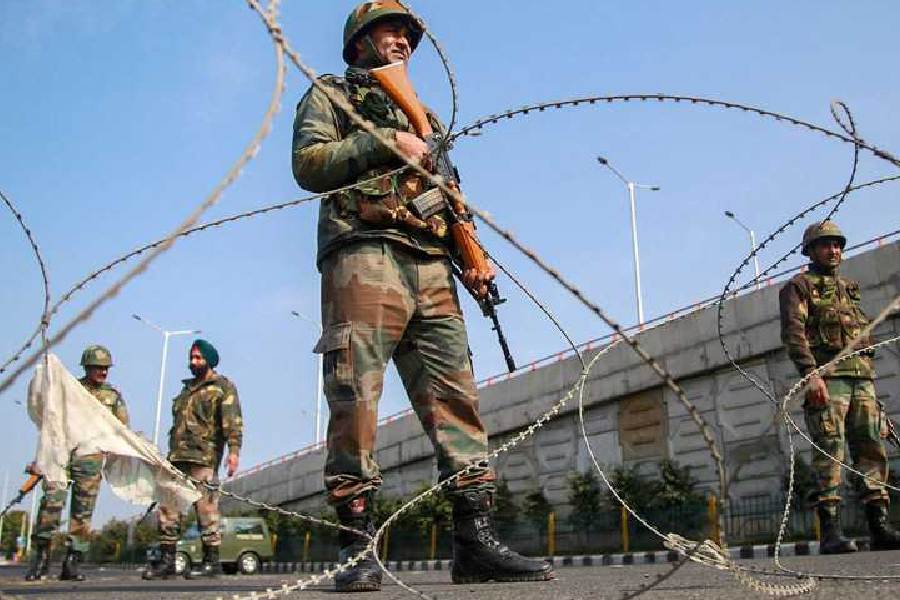Five leading Kuki-Zo organisations from Manipur have jointly issued a statement against the Centre’s decision to scrap the free movement regime (FMR) and fence the international border with Myanmar, urging people “to refuse to participate in any FMR-related activity”.
The FMR allows people living on either side of the international border with Myanmar to venture into each other’s territories without a visa for up to 16km.
“We are opposed to any move to separate or disunite us. In this regard, we are resolute in our opposition to the removal of the Free Movement Regime (FMR) along the Indo-Myanmar border, as this will result in the forced separation of blood brothers on both sides of the border,” the joint statement said.
“The people of Arunachal Pradesh, Nagaland, and Mizoram are also against border fencing and the removal of FMR. We urge everyone — officials, contractors, and others — to refuse to participate in any FMR-related activity."
The joint statement has been released just days ahead of the Lok Sabha session, which starts on June 24. The organisations want the Centre “to listen and act” to end the Manipur conflict, which has been continuing since May 3 last year.
Going by the sentiments articulated through the statement, the Centre could find it difficult to implement its twin decisions, sources said.
Protest rallies were held in Tengnoupal district of Manipur and in Mizoram against the decisions on May 16.
The joint statement said: “Lastly, it is clear that violence in Manipur will not end without a political solution that takes into account the needs and aspirations of minorities. And this should come at the earliest to end the suffering of the people. We urge the central government to expedite our demand for a Union Territory with a legislature under Article 239A.”
The organisations will hold a mass rally on June 24 in Churachandpur, Pherzawl, Kangpokpi and Tengnoupal districts. “It is time for the Centre to listen and act,” the statement said.
Five districts of Manipur — Churachandpur, Chandel, Kamjong, Tengnoupal and Ukhrul — share a 398km border with Myanmar. Besides Manipur, Arunachal Pradesh (520km), Nagaland (215km) and Mizoram (510km) share borders with Myanmar. The Assam Rifles guards the international border with Myanmar.
The five organisations — the Indigenous Tribal Leaders’ Forum (ITLF), Committee on Tribal Unity (COTU), Indigenous Tribes Advocacy Committee (ITAC), Kuki Inpi Chandel (KIC) and Kuki Inpi Tengnoupal (KIT) — have also opposed the Manipur government’s plans to conduct autonomous district council (ADC) elections as “an attempt to create division among us by pitting us against each other”.
Union home minister Amit Shah had on February 8 announced the decision to scrap the FMR agreement with Myanmar to ensure internal security and maintain the demographic structure of the northeastern states, two days after he announced a move to fence the porous India-Myanmar border.
“Since the Ministry of External Affairs is currently in the process of scrapping it, MHA has recommended the immediate suspension of the FMR,” Shah had said in a February 8 post on X.
On February 6, Shah had posted on X the Centre’s decision to construct a fence along the entire 1,643km India-Myanmar border. Only a 10km stretch in Moreh (in Tengnoupal) has been fenced, and work on another 20km will start soon.
The BJP-led Manipur government and civil society organisations in the Meitei-majority valley districts had welcomed the decisions. These groups attribute the ongoing ethnic conflict in the state to the influx and narco-terrorists from across the border.
However, the Kuki-Zo organisations in Manipur had opposed the decisions. The Mizoram and Nagaland Assemblies adopted resolutions on February 28 and March 1 opposing the Centre’s decisions on FMR and border fencing. The Nagaland Assembly resolution urged the Centre to reconsider its decisions.
K. Vanlalvena, Rajya Sabha MP from Mizoram, had in a representation to Shah in February contended that the international border along Mizoram had been “arbitrarily demarcated” by the British “without proper ground survey and with no regard to ground reality”, because of which “our people were forcibly settled” in three countries — India, East Pakistan (now Bangladesh) and Burma (now Myanmar).
At least 229 people have died and over 67,000 have been displaced in the conflict between the Meiteis and the Kuki-Zos, who mostly live in the hill districts.










